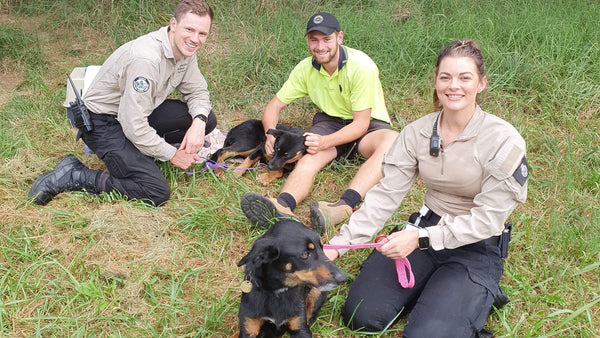AFTERPAY NOW AVAILABLE | NEW YEAR SALES 30% OFF STORE WIDE - CODE "NEWYEAR30"
AFTERPAY NOW AVAILABLE | NEW YEAR SALES 30% OFF STORE WIDE - CODE "NEWYEAR30"

Did you know that 264 dogs and cats are euthanised daily in Australia?
It’s true—simply because there’s no home for them.
More often than not, we're used to seeing dogs donning matching sets with owners, swimming on beaches, or playing fetch in dog parks. But not all fur babies live a life of comfort, love, and luxury. Some have to face the harsh reality of homelessness and death, the consequences of irresponsible pet ownership and excessive breeding.
Feeling overwhelmed and disheartened? Don’t worry. Knowing and understanding the situation is already one way to be part of the solution. Read on, explore these dog rehoming statistics Australia, and together, let’s find a way to help dogs find their home.
Whether you're a passionate advocate for fur babies or simply curious about the state of dog shelters, adoptions, and rehoming Down Under, this list promises to be an eye-opening and heartwarming experience.
24% of the admitted dogs were strays, and 34% were surrendered from local councils. Of this number, over 25% are puppies, and 18% are adults or older than six months. Unfortunately, 20% of these are euthanised.
Most surrendered dogs were considered unwanted (46.5%) for reasons such as too many dogs at home and poor decisions. In comparison, about 20% were due to changed circumstances like owners moving/travelling and having a baby. Other reasons are presented in the chart below.

With these pet rescue centres spread across Australia, everybody can easily report strays in danger and seek help for responsible rehoming of pet dogs. Some of these shelters are:
Suppose you’re interested in adopting fur babies and would like to connect with the nearest pet shelters. In that case, you may also check Pet Rescue’s Rescue Directory, a database for all the animal centres in each Australian state.
In 2022, RSPCA Australia received 94,828 animals, 20% of which were dogs. The rise of pet surrenders is said to be due to the increasing cost of living and the resumption of face-to-face activities.
Several factors lead to the abundance of homeless dogs in shelters and on the streets, including irresponsible pet ownership (e.g. neglecting neutering, resulting in unwanted litters), abandonment due to difficulties, and pets left behind when owners move abroad instead of finding them new homes.
Out of all animals, about 5,840 dogs and 1,700 cats were recorded in 2022. While slightly lower than in previous years, these numbers, if stable, could lead to more reunions with their owners, easing overpopulation in shelters and adoption centres.

As dog prices rise, more Australians are turning to rescue centres. With rescue animals often coming vaccinated, microchipped, desexed, and trained, adopting can save on upfront and ongoing pet costs.
2022 was a good year for 57,195 homeless pets as they found their forever home through Pet Rescue’s free adoption platform. About 33% of this number are dogs!
The Australian Capital Territory has set the standard in pet adoptions with a median time to adoption of 3.2 days for cats and dogs, besting the country’s 21-day median for dogs. With this, ACT has rehomed 88% of dogs and kept their pet euthanasia rate at 8%, among Australia’s lowest rates.
As people sought companionship and solace during COVID-19 pandemic lockdowns and social distancing measures, many adopted dogs to fill the void. According to the Animal Medicines Australia Report, most dogs still came from breeders (40%), followed by 13% from RSPCA and other animal centres.
Other sources are presented below:

March is a month of pawsitive change in Australia because it's National Pet Adoption Month! This is the perfect time to open your heart and home to new pets, especially dogs needing loving homes.
Check your local council announcements, as each state and pet rescue centres and stores usually facilitate big pet adoption events during this time. Who knows, you might find the fur baby for you in March!
As much as we want to give every dog in the streets a home, we must acknowledge that we’re limited alone. Hence, it’s best to coordinate with current Australia dog rehoming programs of your local councils and non-profit organisations.

“A future where every pet is safe, respected and loved.”
Pet Rescue is an Australian animal welfare charity aiming to utilise tech solutions for pet rescues. They launched their pet adoption website with free programs and services in 2004. Today, the site has helped over 1,000 animal shelters and centres rescue and help pets find their forever home.

It’s a non-profit organisation based in Melbourne and established in 1985 with a mission to rescue and protect hundreds of dogs and cats each year from euthanasia. Their no-kill philosophy ensures that animals are given a chance at life. Consequently, they provide veterinary care to nurse sick or injured animals back to health, allowing them to live out their natural lifespans.

Animal rescue and rehoming organisations help councils protect and promote animal welfare, especially dogs, but often struggle with funding due to their reliance on volunteers and public donations.
Hence, this grant is open to approved rehoming organisations and registered charities in NSW, allowing them to apply for up to $100,000 per organisation to support their animal rehoming services.
If you’re part of a rehoming group and are interested in applying for the grant, you may check NSW’s website for the eligibility requirements.

ACT Domestic Animal Services (DAS) is a government agency in the Australian Capital Territory (ACT) responsible for overseeing and managing domestic animal welfare and control within the region. Their primary mission is to ensure the animals' and the community's well-being and safety.
Part of their services is to facilitate dog adoptions. Here are the steps you have to follow to complete a fur baby’s adoption successfully:
These are just a small portion of Australia’s rehoming services, as each council has unique animal welfare programs that can help you process dog adoptions and facilitate responsible rehoming.
All these dog shelter statistics may have left you feeling overwhelmed. But one can always start somewhere to tackle the rising numbers of homeless dogs in Australia. Some of the things you can do are:
Reading this article is already one way of raising awareness. Sharing it with others is another! So, continuously educate yourself about the situation, actively share your knowledge with everyone, and participate in dog rescue and rehoming movements.
You can’t promote something you don’t practice. So, make sure to be a good fur parent yourself. Remember, responsible pet ownership isn’t only limited to providing food and shelter but also includes the following:
If you ever find strays in precarious situations, don’t look the other way! Pet rescue centres are all over Australia. You can ask them for help or offer your services voluntarily for this cause.
There are life circumstances that we cannot foresee, such as moving abroad and financial difficulties, compelling us to surrender our dogs. But the least you could do for your fur baby is prepare him to find a good home before you say goodbye—responsible rehoming.
This entails the following:
One dog at a time!
If you can’t save every dog in shelters, you can give at least one fur baby home instead of purchasing from breeders and pet shops. Besides, it’s also more affordable.
Dogs only want to love and be loved, and they deserve it regardless of their breed or origin. So, if you ever wish to have another pup or have your first fur baby, may you also consider the dogs in shelters, hoping and longing to find their forever home. They, too, can pull off the trendiest bandanas and bow ties and give you unwavering love!